Related Research Articles
In the broader context of racism against Black Americans and racism in the United States, mass racial violence in the United States consists of ethnic conflicts and race riots, along with such events as:
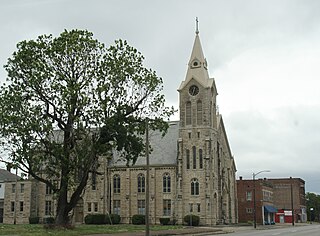
Cairo is the southernmost city in Illinois and the county seat of Alexander County.

Grenada is a city in Grenada County, Mississippi, United States. The population was 13,092 at the 2010 census. It is the county seat of Grenada County.

Starkville is a city in, and the county seat of, Oktibbeha County, Mississippi, United States. Mississippi State University is a land-grant institution and is located partially in Starkville but primarily in an adjacent unincorporated area designated by the United States Census Bureau as Mississippi State, Mississippi. The population was 25,653 in 2019. Starkville is the most populous city of the Golden Triangle region of Mississippi. The Starkville micropolitan statistical area includes all of Oktibbeha County.
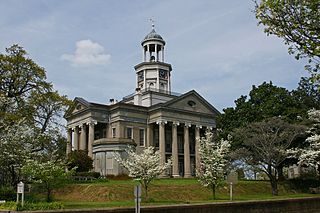
Vicksburg is a historic city in Warren County, Mississippi, United States. It is the county seat, and the population at the 2010 census was 23,856.
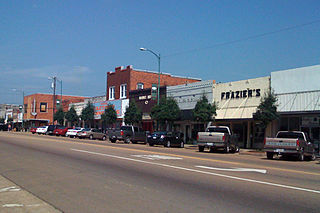
Louisville is a city in Winston County, Mississippi. The population was 6,631 at the 2010 census. It is the county seat of Winston County.

Noxapater is a town in Winston County, Mississippi. The population was 472 at the 2010 census.

The Great Mississippi Flood of 1927 was the most destructive river flood in the history of the United States, with 27,000 square miles (70,000 km2) inundated in depths of up to 30 feet (9 m) over the course of several months in early 1927. The uninflated cost of the damage has been estimated to be between 246 million and 1 billion dollars.
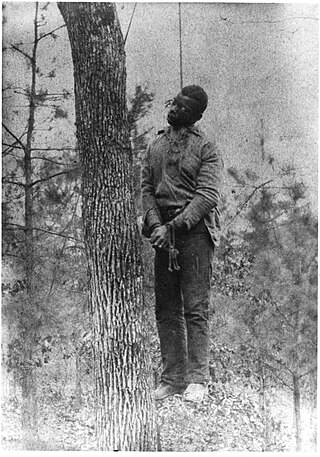
Lynching was the widespread occurrence of extrajudicial killings which began in the United States' pre–Civil War South in the 1830s and ended during the civil rights movement in the 1950s and 1960s. Although the victims of lynchings were members of various ethnicities, after roughly 4 million enslaved African Americans were emancipated, they became the primary targets of white Southerners. Lynchings in the U.S. reached their height from the 1890s to the 1920s, and they primarily victimised ethnic minorities. Most of the lynchings occurred in the American South because the majority of African Americans lived there, but racially motivated lynchings also occurred in the Midwest and border states.
Robert Fox (1846-1933) was an African-American activist who sparked a civil rights battle in Louisville, Kentucky in October 1870 by entering a segregated streetcar. He was born in Kentucky to Albert and Margaret Fox and worked as an undertaker and a grocer. He died in 1933.

Henry Smith was an African-American youth who was lynched in Paris, Texas. Smith allegedly confessed to murdering the three-year-old daughter of a law enforcement officer who had allegedly beaten him during an arrest. Smith fled, but was recaptured after a nationwide manhunt. He was then returned to Paris, where he was turned over to a mob and burned at the stake. His lynching was covered by The New York Times and attracted national publicity.

The Perry massacre was a racially motivated conflict in Perry, Florida, in December 1922. Whites killed four black men, including Charles Wright, who was lynched by being burned at the stake, and they also destroyed several buildings in the black community of Perry after the murder of Ruby Hendry, a white female schoolteacher.
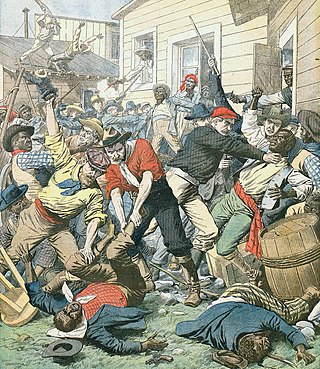
Jim McIlherron was an African-American man who was tortured and executed by a lynch mob on February 12, 1918, in Estill Springs, Tennessee. McIlherron was lynched in retaliation for shooting and killing two white men after a fight broke out.

On April 13, 1937, Roosevelt Townes and Robert McDaniels, two black men, were lynched in Duck Hill, Mississippi by a white mob after being labeled as the murderers of a white storekeeper. They had only been legally accused of the crime a few minutes before they were kidnapped from the courthouse, chained to trees, and tortured with a blow torch. Following the torture, McDaniels was shot to death and Townes was burned alive.

John Carter was an African-American man who was murdered in Little Rock, Arkansas, on May 4, 1927. Grabbed by a mob after another Black man had been apprehended for the alleged murder of a white girl, Carter was hanged from a telephone pole, shot, dragged through the streets, and then burned in the center of the city's Black part of town with materials that a white crowd of perhaps 5,000 people had looted from nearby stores and businesses.
Dan Anderson was an African-American man who was murdered in Macon, Mississippi, on May 20, 1927 at the age of 32. Anderson's father had also been lynched. Anderson was accused of killing T. C. Edwards, a white farmer from Cliftonville, Mississippi. He was arrested in Tuscaloosa, Alabama. A mob of 300 to 500 men followed him and fired more than 200 bullets into his body.
The lynching of Henry Lowry, on January 26, 1921, was the murder of an African-American man, Henry Lowry, by a mob of white vigilantes in Arkansas. Lowry, a tenant farmer, had been on the run after a deadly shootout at the house of planter O. T. Craig on Christmas Day of 1920. Lowry went into hiding in El Paso, Texas; when he was discovered and extradited by train, a group of armed white men boarded the train in Sardis, Mississippi, and took Lowry to Nodena, near Wilson, Arkansas. He was doused in gasoline and burned alive before a mob of 500. A reporter from the Memphis Press witnessed the event, and word of the lynching soon spread around the country, aided by an article William Pickens wrote for The Nation, in which he described eastern Arkansas as "the American Congo".
Owen Flemming or Flemings was an African-American man who was lynched by a mob near Mellwood, Arkansas, on June 8, 1927, after an altercation with a white man who attempted to force him to work on a levee during the Great Mississippi Flood of 1927.
Lation (Ligon) Scott was an African American lynching victim suspected of raping a white woman in Dyer County, Tennessee. Scott was tortured, mutilated and burned alive by a mob on Sunday, December 2, 1917 in downtown Dyersburg.
Luther Holbert was an African American man who was tortured and lynched by a mob in Doddsville, Mississippi on Sunday, February 7, 1904, after being accused of a double murder. An African American woman who was with Holbert was also tortured and killed. Six other people were also killed during the search for Holbert and the woman.
References
- ↑ "Mob Burns Two Blacks At Stake". Miami News-Record . June 13, 1927. p. 1. Retrieved April 15, 2021.
- ↑ Parrish, Susan Scott (2018). The Flood Year 1927: A Cultural History. Princeton University Press. p. 46. ISBN 9780691182940.
- ↑ "MOB BURNS II NEGROES AT STAKE" Asbury Park Press Asbury Park, New Jersey 14 Jun 1927, Tue • Page 13
- ↑ Ginzburg, Ralph (June 14, 2021). "White Attempts in Vain to Rescue Victims". The New York Times . ISBN 9780933121188.